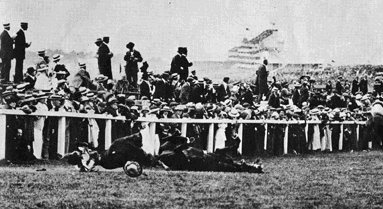UCSB Hist 2c, L 14: Women's
Suffrage & Women's Rights
by Prof. H. Marcuse, May 13, 2003
Question: What factors determine whether implemented changes are LASTING?Short
answer: Ideas and practice must change.
- Recap last lecture: BIG change
- Suffrage movement in Britain, ca. 1900-1920
- Women's movement in Turkey, 1920s-today
(reader essay no. 21)
Announcement: paper due and grading equity
Last Time
Causes of BIG changes in history:
- Lack of balance between political and economic power (underlying
force)
- Some impulse, disrupting force, comes along (often international:
1905, WWI)
- Chasm so wide that "glue" of ideology no longer bridges it (Tagore
quote)
- On a mass scale, people realign their allegiances
- Role of violence, physical force?
When is violence necessary?
Depends on Cross-Class Allegiances
- In colonial context: elites, often Western-educated (e.g. Gandhi, Ho Chi
Minh)
- In European context: traditional elites.
Example: Lady Constance Lytton
- Clip from "Shoulder to Shoulder" (BBC, 1974)
vol. 3, mins: 9:00-20:00
- Viceroy of India, brother is Member of Parliam.
- Emmeline Pankhurst & daughter Christabel
(reader #18: Why we are militant, Oct. 1913)
- Think about applicability in colonial context
Euro-US Suffrage Movement (1)
- Exclusion of women from political process since ancient Greece and Rome
- Enlightenment/French revolution: some philosophes include women (Olympe,
Wollst.)
- Widening male franchise
(1832 in Britain, Civil War in US)
- Origins in antislavery movement (1840)
- 1848: revs. in Europe;
US: Seneca Falls declaration
- 1850s-70s: Harriet T. and John S. Mill
1869: female taxpayers on school boards
- Middle class and working class women merge interests by 1900
- Emmeline Pankhurst:
1900 Manchester school board
1903 Women's Social & Political Union (WPSU)
"Men understand only violence, they respect only property."
 Suffrage
Movement (3)
Suffrage
Movement (3)
- Civil disobedience:
- heckling
- arson in rail cars
- slashing artworks
- smashing store windows
- caustic liquids in mail boxes
- cutting slogans into golf courses
- Derby Day, May 31, 1913:
Emily Davison
 Suffrage
Movement (4)
Suffrage
Movement (4)
From violence to non-violence:
- depends on public attention ("public sphere")
- use of and role of mass media
- Hunger strike in prison
 "Cat
and Mouse Act:" release to recover, rearrest
"Cat
and Mouse Act:" release to recover, rearrest- Clip from "Shoulder to Shoulder" (BBC, 1974)
vol. 5: Emily Davison in prison after assaulting a minister (thought was Lloyd
George)
mins: 34:30-39:00
Suffrage Movement (5)
- World War I ended & fulfilled it
- (see Reader no. 19: May 1, 1915 conf.)
- dockyards, munitions factories, driving trucks, streetcars, clerical, commercial,
…
- changes in clothing (& underclothing), hairstyle, sports (cycling, tennis)
- Who got suffrage when?
Women's suffrage around the globe
- 1893 New Zealand [Montana: Jeanette Rankin, Nov. 1916]
[California: Barbara Lee, Feb. 2003]
- 1902 Australia
- 1906 Finland
- 1913 Norway
- 1914-1939: 25 years, 28 countries
- 1917 Soviet Russia
- 1918 Canada [15 states in US], GB (over age 30; 1928: 21)
- 1919 Germany, Austria, Poland, Czechoslovakia
- 1920 US [Tennessee=36th state], Hungary
- 1945 France, Italy, Romania, Yugoslavia, China
- 1949 India, Pakistan
Women in Turkey (1)
- Reader essay #21 by Nermin Abadan-Unat
- p. 177 thesis: "Turkish women have been emancipated but not yet liberated."
- Ottomans vs. Ataturk (Mustafa Kemal): reforms
- Absence of colonial rule (different trajectory than "3rd W.")
- Tradition of modernization (indig. Ottoman elite, 1793)
- Issue of women in public discourse (ideology)
- Women's contribution (by elites and masses)
- Collapse of empire (international)
- Ataturk's personality (leader),
persuasion through public address (media)
"infuse new hope into a defeated and impoverished nation"
Women in Turkey (2)
- p. 181: "… that the singling out of women as the group most visibly oppressed
by religion was absolutely central to Ataturk's attacks on the theological
state, culminating in the abolition of the caliphate."
- Align with "West", not "Kinder, Kuche, Kirche"
(children, kitchen, church) of Italy and Germany
- reforms instigated by elite vanguard, w/o participation of (grass roots)
women's movement
Women in Turkey (3)
- statistics showing substantial progress:
education and civil service, government
- multiparty system reversed some gains:
gave voice to fundamentalist Islamic currents
- legal gains fine, but some women don't want
"progress" (wearing of veils, shari'a)
- p. 191: tension between
"Westernization, Islam, socialism"
- male authority predominant in private life;
equality in public life – does it work?
lecture by H. Marcuse on 5/15/03; outline
prepared for web on 5/22/03.
back to top, to Hist 2c homepage
 Suffrage
Movement (3)
Suffrage
Movement (3)  Suffrage
Movement (3)
Suffrage
Movement (3)  Suffrage
Movement (4)
Suffrage
Movement (4)  "Cat
and Mouse Act:" release to recover, rearrest
"Cat
and Mouse Act:" release to recover, rearrest